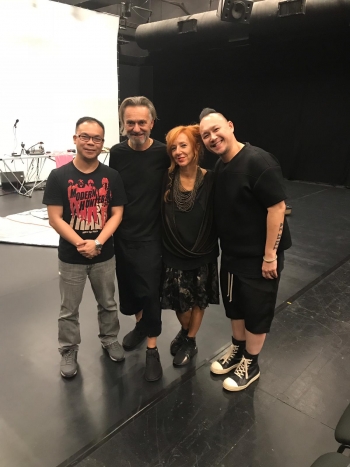In October this year, Hong Kong Repertory Theatre Company and the West Kowloon Cultural District co-presented the Hong Kong International Black Box Theatre Festival 2018, bringing to Hong Kong four studio theatre works that are diverse in style and form. While the other three productions spotlight non-professional or teenage performers in the cast, MDLSX by Motus stands out as a multimedia solo featuring a professional and gender-blurring performer. It was the first sold out programme at the Festival.
This explosive, controversial work was the first stage production Motus presented in Hong Kong. I interviewed the artistic directors Enrico Casagrande and Daniela Nicolò, who talked about the creative process of MDLSX, and their experience of developing Motus from a local group in a small town in Italy into a theatre company that travels around the globe.
(From left to right) William Chan (陳瑋鑫), Enrico Casagrande, Daniela Nicolò, Low Kee Hong (Head of Theatre, Performing Arts, West Kowloon)
“Autobiographical” monologue adapted from a novel
Those who have seen MDLSX would be impressed by Premio Ubu-winner Silvia Calderoni’s charismatic yet powerful physicality, as well as the mix of personal home movies, live feed projection and pop songs from the 1970s, 1980s and 1990s featured in the show. But what’s most moving about the work may be the protagonist’s search for their identity, and their journey of self-discovery about gender.
However, many audience members who saw the performance at the Festival might have been misled by the term “autobiographical”, which was used in the publicity materials of the show, into thinking that the 80-minute monologue was the true story of the solo performer Silvia Calderoni. In reality, the work was adapted from the novel Middlesex by American author Jeffrey Eugenides.
Published in 2002, Middlesex is the winner of the 2003 Pulitzer Prize for Fiction. The portrayal of the intersex condition in the novel is based on stories and medical histories of real persons which the author studied during his research. As Nicolò revealed, except for the quotes by Paul B. Preciado, Donna Haraway and Judith Butler, all the scenarios that appear in the show are taken from the novel. First, she selected around 100 passages that she thought would resonate with Silvia; then she asked Silvia to read them, and pick some music to accompany the texts. One can hear echoes of Silvia’s emotions in the 23 songs included in the soundtrack, since all of them are connected to her life. While the stories being told are not autobigraphical accounts of Silvia’s life, the home movies shown at the beginning and the end of the show are taken from Silvia’s personal collection. “[Silvia] says it is her emotional biography,” Nicolò mentioned.
On the creative process of the duo, Casagrande said they usually start with a set or a scene. ‘This time it was the DJ, so we knew there would be a music mixer and a laptop, and then we would need a table.” He said ideas for the props and sets followed as they improvised, like the microphone and rolling light, as well as the triangular carpet and the round projection screen. “We collected a lot objects and tried them out during the rehearsals.”
Both directors explained that when MDLSX was debuted as a work-in-progress in Paris, it had a different ending which depicted a scene from the novel. “The main character meets a guy who tries to rape ‘her’ but then finds out ‘she’ is a monster.” In the end, the directors did not want to present the idea of monster in the work; rather, they wanted to prompt the audience to think about diversity, so they decided to replace the original ending with the mermaid scene. “Both the mermaid and the library scenes we added later are taken from the novel.” They stressed that no original scenes were added to the work, even though the whole performance was developed through improvisation.
From Rimini to around the globe
MDLSX features a mix of different elements including video, music and physical movement. When asked if this demonstrates the usual style of Motus’s works, both directors said there have been shifts in form and style in the group’s repertoire since its founding 27 years ago.
Casagrande and Nicolò stated that neither of them graduated from theatre school; they studied history of economics and sociology in the university, and received theatre training through workshops. The two met when they took part in a university theatre group in Urbino. The duo created an independent theatre group called Opere dell’Ingegno (Works of the mind) in 1991, which changed its name to Motus (“Movement” in Latin) the following year.
“At the beginning, our shows were more connected to the body.” As Nicolò remarked, the group’s early works were mainly installations, site specific works, operas, and artworks with the body as the focal point. “We love film and music, and we try to include these elements in our works.” Casagrande added that they began to incorporate video into their works in around 2000. “For us, video is an element that helps us to connect the black box with the outside reality, and to bring reality inside—not as a background, but as part of the dramaturgy.” As they remarked, the group used elaborate scenography and sets in their early works, but began to gravitate towards a more minimalist approach after the financial crisis in 1998.
In recent years, the group has presented works revolving around politics, gender and discrimination, bringing up larger issues through personal histories, and taking materials from reality, actors, novels and interviews. This change in the group’s creative approach opens up connections between their art and the form of documentary, and garners greater recognition for their works overseas. “At the beginning, we were a young company, so our works were more connected to Italy.” As the duo started to create their works around more universal issues and political themes, they began to receive invitations to overseas festivals. Many of their works were developed or premiered in Eastern Europe, such as Croatia, Slovenia and Poland. Casagrande said they consider Europe one big country where different nations connect with one another, and they appreciate the residency and touring opportunities.
After 30 years of theatre making under the name of Motus, the company has evolved from a small and independent group located in the small town Rimini in Italy, to a theatre company presenting eclectic works around the globe. The pair of artistic directors cum couple suggested emerging artists to centre their works around universal topics rather than local issues, so that they may have more opportunities to showcase their creations overseas.
Casagrande and Nicolò also presented their own festival in the early years, in order to gain exposure to presenters and curators. Instead of waiting for invitations, they created a network and invite curators to join, providing a platform for them to talk to the artists and see their works. When the small scale festival began to be known outside Italy, overseas curators were invited to join. Most of them were looking for something new. The works presented in the festival might be less than perfect; however, as long as they illuminated important issues in their home country, they would appeal to audiences abroad. This brought the artists touring and residency opportunities.
As the two directors contended, space and money are a key concern when it comes to creating new works. “In Italy, it is impossible for an independent company to get support.” Fortunately, the recent years have seen the the launch of various residency programmes. MDLSX was largely developed during a 25-day residency in Paris. For those artists who are struggling to go abroad, the duo shared a few words of advice. “Give it a try! Talk to the curators, gather more groups and artists, start the dialogue,” they remarked. “Some groups may disappear after one or two shows; if their works are not good enough, there is the risk of failing.”
Obviously, this is not (yet) the case with Motus. We hope they will bring more interesting works to the stages of Hong Kong soon.
作者簡介:資深藝評人、媒體製作人、業餘劇團「友好戲體」創團藝術總監及「William et al. 創作研究室」主席。2015-2018年為國際演藝評論家協會(香港分會)項目經理,專責推行「香港戲劇資料庫暨口述歷史計劃(第一期)」。
照片由作者提供





